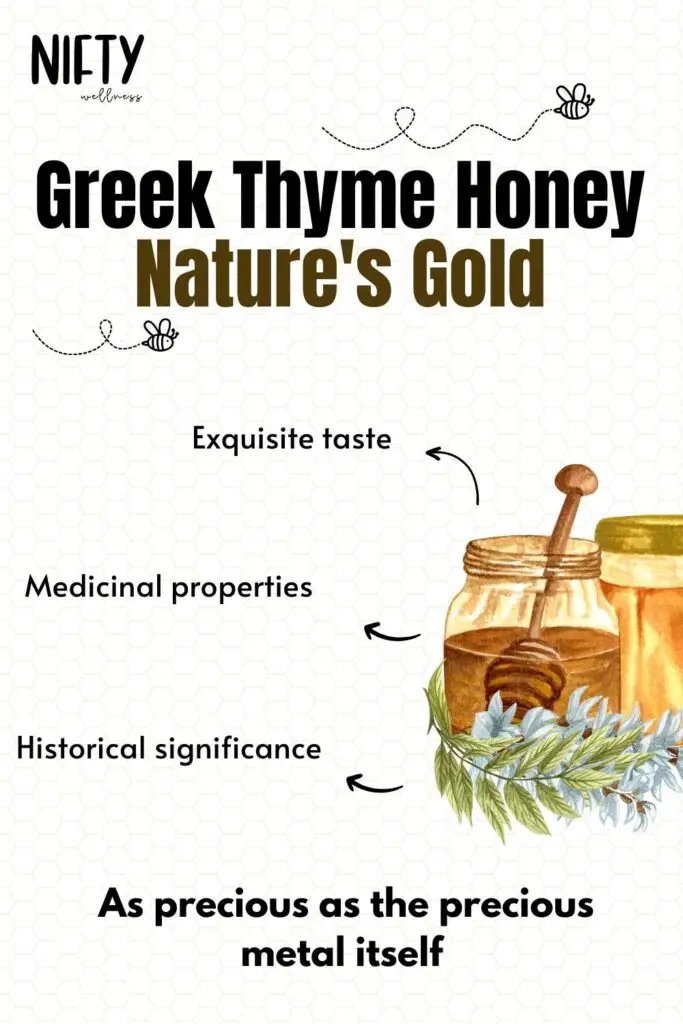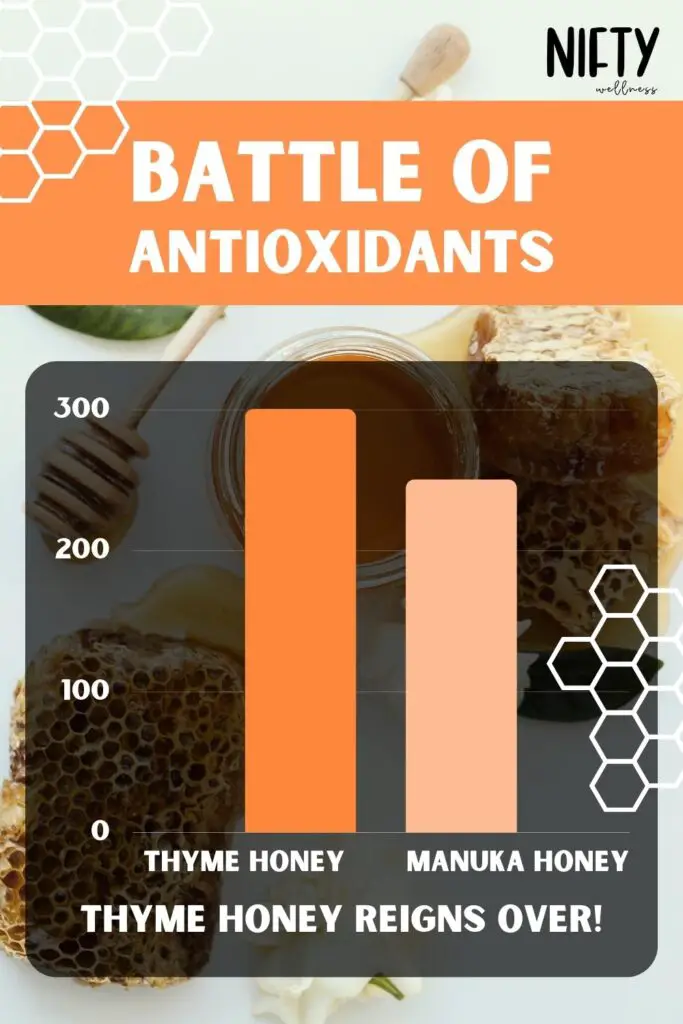Journey with us into the captivating realm of thyme honey, a golden nectar forged by nature’s hand in the petals of thyme blossoms. Beyond its irresistible sweetness, thyme honey is renowned for its extraordinary properties, offering a treasure trove of benefits. Discover the unique variants that nature bestows upon us, each with its distinctive character and flavour profile. Unearth the historical roots that intertwine with thyme honey and witness its enduring significance throughout the ages. Our exploration unravels the secrets of this remarkable elixir, showcasing six exceptional benefits while weaving a tale of history, diversity, and the alluring allure of thyme honey.
What Is Thyme Honey?


Thyme honey, much like the name suggests, derives from the flowering thyme plant. Thyme is a member of the nectar-producing mint family known as Lamiaceae, which houses other popular herbs such as mint, sage, oregano, and lavender.
There are several different types of thyme plants belonging to the Thymus family, though the most common type is Thymus vulgaris.
Thyme has long been used throughout human history as a medicinal herb. The ancient Sumerians used thyme for its antiseptic properties.
During the Middle Ages, thyme was used in the treatment of diseases such as multiple sclerosis and leprosy. Thyme is still frequently used today in both natural, herbal medicines and by the pharmaceutical industry.
Most thyme honey derives from the Thymus vulgaris variety as the evergreen herb is a perennial and thrives in hot, sunny climates with well-drained soil.
Honey bees gather the pollen of the thyme plant during pollination and use it to create thyme honey. This monofloral honey is produced across the world but comes mainly from Italy, Greece, Spain, France, and New Zealand.
(Read more about the equally amazing orange blossom honey – in a new tab.)
Greek Thyme Honey

Greek thyme honey is of the most revered types of Greek honey and has been used by the Greeks since antiquity for its medicinal and nutritional benefits. Thyme-fed bees produce less honey than other bees, making it a rarer and more luxurious honey.
References to honey have been quoted in many classical texts, such as those spoken by the Grecian father of modern medicine, Hippocrates, who wrote, “Honey and pollen cause warmth, clean sores and ulcers, soften hard ulcers of lips, heal carbuncles and running sores.”
Greek thyme honey is known historically as Hymettus honey, as wild thyme grows on Mount Hymettus near Attica.
Mount Hymettus has become synonymous with thyme honey as it has been the hot spot for Greek thyme honey for thousands of years. Thyme honey is also quite famously produced in Crete and Kythera.
Greek thyme grows wildly in places such as Mount Hymettus, where its primary sources of wild thyme are Thymus capitatus and Satureja thymbra.
It is not uncommon for a certain percentage of Greek thyme honey to be mixed with other Lamiaceae species such as sage, oregano, and rosemary due to its wild nature.
Did you know? The Mount Hymettus region is known by locals as “Trelos” or crazy, likely due to the wild, erratic behavior of the pollinating bees. Others think the area’s unstable weather patterns have contributed to its crazy reputation.
Greek thyme honey is light in color, and its flavor reflects the wild nature of the flowers and herbs that blanket the mountains in the spring and summer months. In Greece, a popular way to sweeten fresh Greek yogurt is to drizzle thyme honey on top.
Hyblaean Honey
Another widely known Mediterranean variety of thyme honey is Hyblaean honey from the Iblei Mountains in Sicily. Hyblaean honey, a variety celebrated for its unique floral notes and herbal undertones, originates from the Mediterranean region. This thyme honey captures the essence of the Hyblaean Mountains, where thyme plants flourish in the island’s temperate climate.
Like Hymettus honey, Hyblaean honey is largely composed of the wild thyme variety Thymus capitatus and has a long and important place in Sicilian history, culture, and economy.
New Zealand Thyme Honey
First brought over by gold miners in the 1800s, thyme honey now grows throughout New Zealand. New Zealand thyme honey, hailing from the pristine landscapes of the Kiwi nation, boasts a distinctive character with subtle floral hints and a robust, full-bodied flavour profile. Bees collecting nectar from the abundant thyme fields create this exceptional honey variety.
Thyme and thyme honey, most commonly produced from the common thyme variety Thymus vulgaris, is now widely celebrated at the Alexandra Thyme Festival.
Check out our blog Chesa Fruits: Nutrition & Benefits Of The Infamous Eggfruit. From boosting immunity to aiding digestion, discover the amazing ways chesa fruits can enhance your health and well-being.
Thyme Honey Health Benefits

Potent Source Of Antioxidants
Thyme honey has one of the highest antioxidant levels of all types of honeys, primarily due to its strong levels of polyphenols and flavonoids.
These protective antioxidants defend the body from aging, disease, infection, various types of cancer, pollution, and more. Beyond its robust antioxidant properties, thyme honey serves as a reservoir of health benefits. Its rich, golden hues signify a powerful ally in your journey to well-being. The antioxidants in thyme honey offer crucial protection to your cells, guarding against oxidative stress and the harmful effects of free radicals. These properties support your body’s immune defenses and promote healthier, more radiant skin.
Anti-Cancer

Several different studies over the past couple of decades have linked thyme honey to a reduction in cancer cells. One 2009 study concluded that a thyme honey-enriched diet may prevent the development of breast, prostate, and endometrial cancer cells.
Similar research suggests thyme honey may reduce the vitality of hormone-dependent cancer cells. Thyme honey’s antioxidants may also benefit the body’s defense against cancer as it prevents free radicals from causing cellular damage.
Anti-Inflammatory
Thyme honey contains antioxidants and phytochemicals such as flavonoids that are known to have anti-inflammatory properties. It is especially beneficial for those with inflammation of the stomach.
Thyme honey’s antioxidants, phytochemicals, and antibacterial properties team up to prevent and treat gastric irritation by soothing an irritated stomach lining.
Moreover, the anti-inflammatory virtues of thyme honey contribute to a sense of overall wellness. Inflammation is at the root of many health issues, and this honey variety’s natural ability to reduce inflammation makes it a valuable addition to your dietary routine.
Natural Healer

Two of thyme’s active ingredients are thymol and carvacrol. These active ingredients are common to the Lamiaceae family of herbs and have been shown to have strong antimicrobial, antibacterial, and antifungal effects.
These compounds can effectively inhibit gram-positive and gram-negative bacteria, as well as antibiotic-resistant bacteria.
Thus, thyme honey can be a fantastic topical treatment for wounds, burns, minor scrapes and can be consumed to naturally treat a sore throat or common cold.
Assists Against Seasonal Allergies
For those who battle seasonal allergies, thyme honey can be a game-changer. Consuming local honey can expose your body to trace amounts of pollen allergens. Over time, this can help build tolerance, potentially reducing allergic reactions and making the changing seasons more bearable. Consuming local honey, especially during allergy season, is believed to help the body’s natural response to allergies.
Thyme honey may be particularly beneficial for this reason as it contains higher levels of the well-researched flavonoid quercetin compared to other types of honey.
Quercetin has been linked to reduced allergic reactions as it boosts the immune system and stabilizes the cell membranes of allergens and prevents them from releasing histamine.
Promotes Relaxation

What’s more, thyme honey isn’t just about physical well-being—it also holds a unique place in promoting relaxation. As the day unwinds, indulging in a warm cup of thyme honey tea can be a soothing ritual. The natural compounds in this honey encourage calmness and tranquility, making it the perfect choice for a bedtime companion. Allow the delicate sweetness of thyme honey to guide you to a night of peaceful rest and rejuvenation, enhancing your overall quality of life.
Thyme honey is a fantastic honey for calming the mind and body due to its high concentrations of Vitamin D. For ultimate relaxation, mix a spoonful of honey into a warm cup of herbal tea before bedtime.
Thyme honey can also help with mental and physical exhaustion by easing stress and promoting rejuvenating rest.
Read our blog Myomin Benefits & Side Effects: Is It Powerful. Welcome to a journey of vitality and wellness, centered around the miraculous powers of Myomin.
Thyme Honey vs Manuka Honey


Manuka honey is a distinctive honey that derives primarily from the Manuka or Tea Trees of New Zealand. A variety of thyme honey, most commonly Thymus vulgaris, is also grown and cultivated throughout New Zealand.
In general, the two types of honey are similar in regards to their antibacterial and antimicrobial abilities.
While both New Zealand Manuka and thyme honey have antioxidant and anticancer properties, one 2016 study found that thyme honey was 1.5 to 2-fold more potent at treating Caco-2 cells and had a stronger free radical scavenging capacity than Manuka.
Conclusion
With its rich history and numerous health benefits, thyme honey is undoubtedly a remarkable addition to your pantry. Derived from the thyme plant, this golden elixir offers many advantages beyond its delicious flavour. Thyme honey’s potent antioxidant properties provide protection against various diseases, aging, and even cancer. Its anti-inflammatory qualities make it an excellent choice for soothing gastric irritation and inflammation. Moreover, thanks to quercetin, thyme honey’s assistance against seasonal allergies can make allergy seasons more bearable. Lastly, its relaxation-inducing attributes, enhanced by Vitamin D, offer a perfect way to unwind at the end of the day.
While both New Zealand Manuka and thyme honey share valuable antibacterial and antimicrobial properties, they exhibit higher potency in certain aspects, making them a remarkable choice for those seeking natural remedies and holistic well-being. So, why not savour a spoonful of thyme honey and let its incredible benefits elevate your health and overall quality of life?
Frequently Asked Questions

Is Thyme Honey Healthy?
Thyme honey is an incredibly healthy, natural honey that contains gut-healthy enzymes, immune-boosting properties, and defensive antioxidants that protect that body from cellular damage.
Thyme honey is also highly antimicrobial and can be used to treat colds, coughs, sore throats, and minor wounds.
What Does Thyme Honey Taste And Smell Like?
Thyme honey is reminiscent of the herb, with strong, aromatic flavors that are fresh, herbal, savory, and slightly peppery. Thyme honey has a medium sweetness with subtle notes of fruit, florals, and clove. Its herbal aromatics are fragrant and long-lasting.
What Does Thyme Honey Look Like?
The color of thyme honey will vary slightly depending on the species of thyme and the region in which it is produced. In general, thyme honey is a light to dark amber color, with Greek thyme honey being on the darker side.
How Do You Use Thyme Honey?
Thyme honey can be used like other types of honey: to sweeten food and drink, applied to the skin topically, or used as a natural sore throat and cough treatment.
Do Thyme And Honey Go Together?
Thyme and honey make a fantastic pairing as the fresh, herby thyme balances out the sweet complexities of raw, natural honey and its floral undertones.
How Does Thyme Help The Body?
Thyme is a powerful source of vitamins and minerals, supplying you with a healthy dose of Vitamin C, Vitamin A, copper, iron, and manganese. Thyme is also incredibly rich in antioxidants that help the body’s immune system stay healthy.
